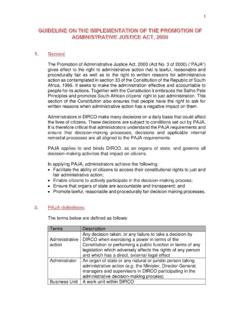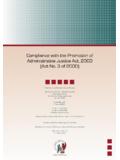Transcription of The Promotion of Administrative Justice Act
1 The Promotion of Administrative Justice Act Administrators' Guide Written by - Parts 1 to 7: Iain Currie and Jonathan Klaaren, Research Unit for Law and Administration, Associate Professores at the University of the Witwatersrand Part 8: Thinus Rudolph, Jakkie Wessels, Lecturers at Justice College/Department of Justice and Rainer Pfaff, German Magistrate/GTZ-German Technical Co-operation Plain Language Edit: Greg Moran Design and Layout: Greg Moran Justice College and GTZ hold the copyright of this Guide. Permission for reprint will be granted subject to written approval by GTZ and Justice College.
2 In this case the Guide or parts thereof must be reprinted in the same format and with the same contents referring to Justice College and gtz - German Technical Co-operation as the copyright holders. Contact number for GTZ- Legislative Drafting Project: 012/3227558 Promotion of Administrative Justice Act Administrators Guide 2 C O N T E N T S Topic Page Part 1 INTRODUCTION THE AIM OF THIS GUIDE .. 3 Part 2 IMPORTANT TERMS AND CONCEPTS .. 4 The Constitution .. 4 The Rule of Law .. 5 The Law .. 5 The Bill of Rights .. 6 The State.
3 7 Administrative Law ..7 Democracy .. 9 Judicial Review .. 10 Batho Pele .. 10 Part 3 AN INTRODUCTION TO THE AJA .. 12 Part 4 Administrative ACTION .. 14 a decision .. 15 that is of an Administrative nature made in terms of empowering provision .. 15 not specifically excluded .. 16 by an organ of state .. 17 that adversely affects rights .. 17 direct external legal effect .. 18 Part 5 PROCEDURAL FAIRNESS .. 22 What does procedural fairness mean? .. 23 Two kinds of Administrative action that require procedural fairness.
4 23 Decisions affecting any person (Section 3) .. 24 Decisions affecting the public .. 26 Part 6 GIVING REASONS .. 29 When should I give reasons? .. 29 Who can request reasons? .. 30 What are adequate written reasons? .. 30 Structure of .. 30 Part 7 JUDICIAL 31 31 Exhaustion of internal remedies .. 31 Time limit for judicial 33 The grounds on which Administrative action can be reviewed .. 33 When an Administrative decision is taken to court .. 37 Part 8 A PRACTICAL 38 Promotion of Administrative Justice Act Administrators Guide 3 The aim of this guide is to provide administrators in the public service with an introduction to the most important requirements of the Promotion of Administrative Justice Act 3 of 2000 ( AJA ).
5 The AJA was passed by Parliament to give effect to the rights to just Administrative action in s 33 of the Constitution. The AJA also aims at promoting an efficient, accountable, open and transparent administration. The AJA: Sets out the rules and guidelines that administrators must follow when making decisions; Requires administrators to give reasons for their decisions; Requires administrators to inform people about their rights to review or appeal and to request reasons; and Gives members of the public the right to challenge the decisions of administrators in court.
6 Administrative Law ..is the body of law that controls the government and the public administration. Note This guide does not include the Code of Good Administrative Conduct that the Minister of Justice must still draw up. This Code will include guidelines and information for administrators to assist them to meet the requirements of the AJA. This guide also does not deal with the regulations to the AJA in detail. Instead, it touches only on those dealing with how administrators should work (as they were in June 2001). The regulations to the AJA will change from time to time.
7 As a result, you will therefore need to look at the regulations and the Code of Good Conduct regularly as well. Part 1 Introduction: The Aim of this guide Promotion of Administrative Justice Act Administrators Guide 4 a. The Constitution South Africa is governed by the Constitution of the Republic of South Africa, Act 108 of 1996 (the Constitution). One of the most important things that the Constitution does is to make South Africa a constitutional democracy . This means that the Constitution is the highest law in the country. It contains the Bill of Rights and the rules how government has to function.
8 All laws and all people (including Parliament, the President, the Ministers, the administration and the courts) must follow and obey it. The Constitution contains the most important rules of our political system. It sets out what institutions make up the South African State, what their powers are, and how they may use their powers. The Constitution has a Bill of Rights (including the right to Just Administrative Action) that protects the rights of all people inside the country, and it explains what their obligations and duties are. This part of the guide explains: Some of the terms and concepts needed to understand the way the AJA works and what it is trying to do.
9 It explains: The Constitution; The Rule of Law The Bill of Rights; The State; Administrative Law; and Judicial Review. Part 2 Important terms And concepts Changing the Constitution Because the Constitution is the highest law it is more difficult to change than other laws. The Constitution can only be changed by Parliament if it uses special procedures and if two-thirds of the members of Parliament agree to the change. Promotion of Administrative Justice Act Administrators Guide 5 b. The Rule of Law One of the most important principles contained in the Constitution is the rule of law.
10 To be a constitutional democracy (rather than a dictatorship or a tyranny) the government must act in accordance with the law. This means two things: The government (like everyone else in the country) must obey the law; and The government can only exercise power over people if the law allows it to. c. The Law If the government must obey the law and can only act when the law allows it to, where is the law to be found? The sources of law: Legislation and the common law i. Legislation The Constitution is the highest and most important law in South Africa.












![Promotion of Administrative Justice Act [No. 3 of 2000]](/cache/preview/d/2/b/1/9/3/e/0/thumb-d2b193e068cd6514a9f01ca11404fbca.jpg)

